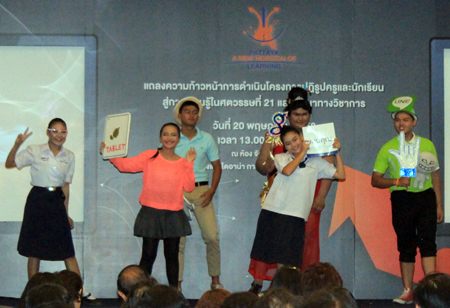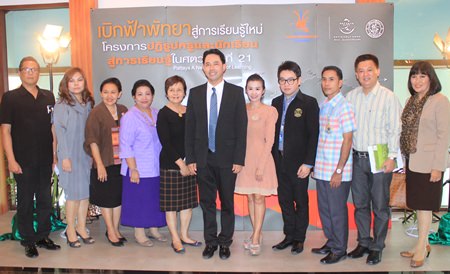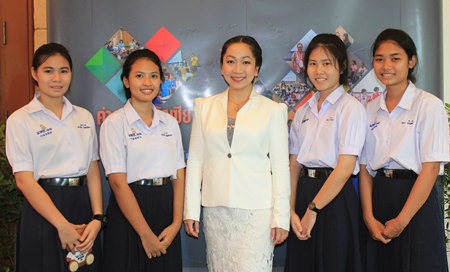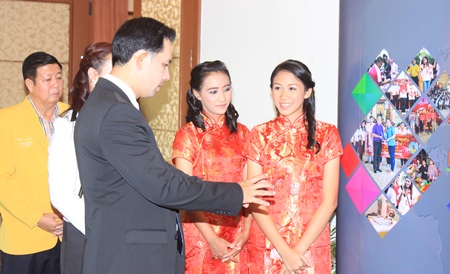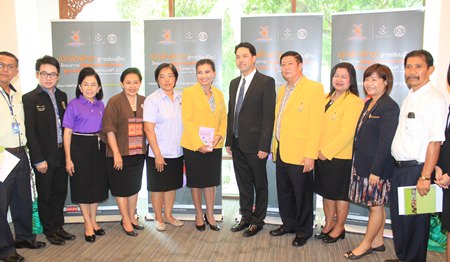Mastering media, technology and language are the keys to future education under the ASEAN Economic Community, an educational seminar in Pattaya was told.
Mayor Itthiphol Kunplome hosted the May 20 “New Horizon of Learning” workshop at the Diana Garden Resort attended by businesses, community leaders, city council members, school administrators and teachers.
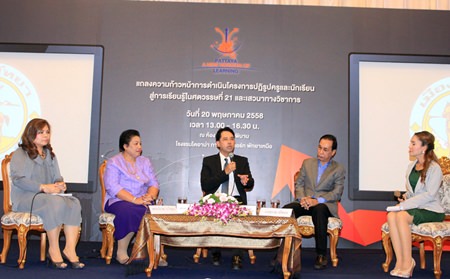 (L to R) Assistant Professor Dr. Jiraporn Rahothan PhD, Associate Dean of the Sriprathum University Graduate School; Associate Professor Pimpan Dechakup from Chulalongkorn University; Mayor Itthiphol Kunplome; and Suparb Krikajai – director of Thai PBS TV, host an open forum on teaching development.
(L to R) Assistant Professor Dr. Jiraporn Rahothan PhD, Associate Dean of the Sriprathum University Graduate School; Associate Professor Pimpan Dechakup from Chulalongkorn University; Mayor Itthiphol Kunplome; and Suparb Krikajai – director of Thai PBS TV, host an open forum on teaching development.
Organized to give participants a chance to brainstorm and consider plans to teach media and technology in Pattaya schools, the seminar featured lectures from Chulalongkorn University journalism associate professor Pimpan Dechakup, Sriprathum University graduate school assistant professor Jiraporn Rahothan, and Thai PBS television executive Suparb Krikajai.
Itthiphol noted Pattaya has made an agreement with the journalism and mass communication faculty at Thammasart University to upgrade Pattaya’s teaching of media and technology by 2019.
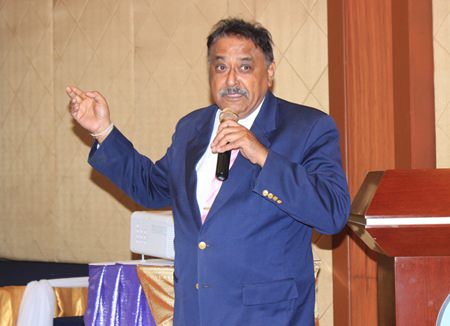 Pratheep “Peter” Malhotra, MD of Pattaya Mail, talks about the need for more foreign teachers to teach English.
Pratheep “Peter” Malhotra, MD of Pattaya Mail, talks about the need for more foreign teachers to teach English.
He said the project, if successful, will create opportunities for students to be able to choose learning suitable to their abilities and skills, allowing them to find a job or continue to study further.
He said a major goal is to have students to be able to communicate in at least two languages: Thai and English. They should be able to use technology morally, uphold Thai values and culture and conserve the environment, he said.
Jiraporn said Pattaya’s school system should reflect the city’s goals and identity, but also be qualified to an international standard.
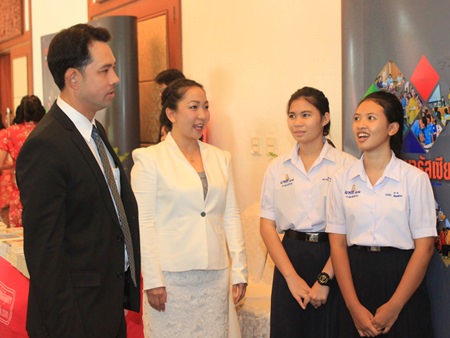 Mayor Itthiphol Kunplome chats with local students.
Mayor Itthiphol Kunplome chats with local students.
The city is trying to develop a prototype school and program that includes quality management and academic operation. Administrators and teachers should be able to use information technology and communicate in English, he said.
Suparb noted that Thais have had great success communicating with foreigner via gestures and body language, but English proficiency will be essential under the AEC.
He said the government must improve the teaching of English immediately in public schools. Fewer than 30 percent of Thais can afford to send their children to private school to learn English. Thus, with most kids in public schools, those institutions must be improved, he said.
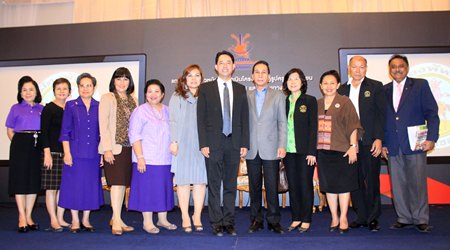 Mayor Itthiphol Kunplome (center), along with expert lecturers, community representatives, city council members, school management, teachers, and relevant organizations take part in the exhibition.
Mayor Itthiphol Kunplome (center), along with expert lecturers, community representatives, city council members, school management, teachers, and relevant organizations take part in the exhibition.
During the open forum, Pattaya Mail MD Pratheep Malhotra said that it was a real shame that Thailand had not taken English language education in our primary schools seriously. “Whilst we were busy modernizing our country for the past half century, becoming the envy of our neighbours in the fields of technology and industry, not to mention tourism, we lacked the foresight to seriously teach English as a second language in our schools.
“Now, as we are on the verge of entering the AEC, we suddenly realise that it’s going to be tough competing with our ASEAN partners, especially where English is vital to negotiations and business dealings.
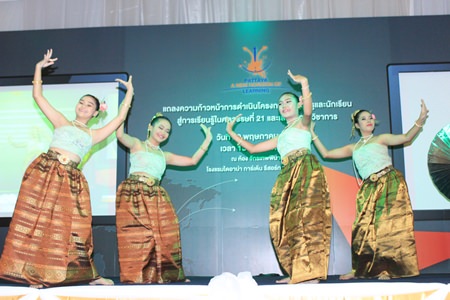 Students from Pattaya City School #11 perform for the assembly.
Students from Pattaya City School #11 perform for the assembly.
“To ensure that the new generation of Thais will have better opportunities to join and compete in the global community, we must teach English in all our primary schools even if we have to employ foreign teachers. They don’t all have to come from Australia, Europe or USA, because there are also many qualified tutors from English speaking countries in Asia who are more than willing to take up teaching assignments in Thailand.”
